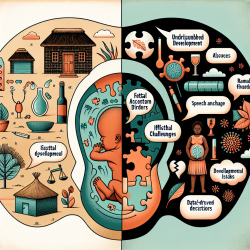As a passionate speech-language pathologist dedicated to creating great outcomes for children, I am excited to share insights from a groundbreaking research article: "The predictive value of universal preschool developmental assessment in identifying children with later educational difficulties: A systematic review." This comprehensive study underscores the importance of early developmental assessments and their predictive value for later educational success. Let's delve into the key findings and practical implications for practitioners.
Key Findings from the Research
The systematic review analyzed 13 studies, focusing on preschool developmental assessments and their ability to predict later educational difficulties. The studies varied in terms of age at initial assessment (1-5 years) and follow-up (4-26 years). Despite the heterogeneity, several critical insights emerged:
- Combined Measures are Highly Predictive: The most predictive assessments combined multiple measures, such as screening tools, teacher ratings, and developmental histories. This multi-faceted approach offers a comprehensive view of a child's developmental progress.
- Stand-Alone Measures Also Perform Well: Stand-alone measures like the Ages and Stages Questionnaire (ASQ) showed adequate predictive value, making them a viable option for resource-constrained settings.
- Latency and Age Impact Predictive Value: Shorter latency between assessments and older age at initial assessment correlated with higher predictive validity. This highlights the importance of timely and age-appropriate assessments.
Implementing Research Outcomes in Practice
Practitioners can leverage these findings to enhance their assessment protocols and intervention strategies:
- Adopt a Multi-Measure Approach: Incorporate a combination of screening tools, teacher observations, and developmental histories to capture a holistic view of a child's abilities. This approach can help identify children at risk more accurately.
- Utilize Stand-Alone Tools: In settings where resources are limited, using reliable stand-alone tools like the ASQ can still provide valuable insights into a child's development and potential educational challenges.
- Timely Assessments: Ensure assessments are conducted at appropriate developmental stages. Early identification and intervention are crucial for mitigating future educational difficulties.
Encouraging Further Research
While the current research provides valuable insights, ongoing studies are essential to refine and validate assessment tools. Practitioners are encouraged to stay updated with the latest research and consider participating in studies to contribute to the evidence base.
To read the original research paper, please follow this link: The predictive value of universal preschool developmental assessment in identifying children with later educational difficulties: A systematic review.










